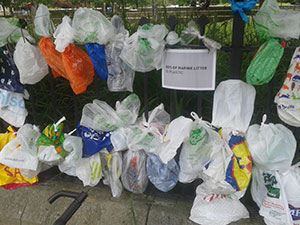Municipal Single Use Plastics Bans Gaining Traction in Southeast PA

Photo Source: plastic bags tied to fence by Dunk, licensed under CC-BY-2.0
Spring 2023
Each year, Pennsylvanians use more than 4.7 billion plastic bags — less than 2% of which are ever recycled. Single use plastics have become ubiquitous in our packaging and transport of items, and reducing our reliance on these materials has been a priority for Pennsylvania environmental advocates for some time.
After PA's "ban on single use plastic bans" expired in 2021, many cities and municipalities in Pennsylvania instated local bans on single use plastics. To date, five Chester County municipalities have banned single use plastics (West Chester, West Goshen, Easttown, Uwchlan, and Tredyffrin), though their ordinances have slight variations from one to the next. Some stores have opted to no longer provide plastic bags, with or without a ban in place.
The idea behind single use plastic bans is simple: although extremely common, these types of materials are wholly unnecessary and substitutable for reusable products, in most cases. Reducing plastic usage will save energy and resources expended in producing and transporting (and recycling) the plastic, and will keep these plastic products — which are commonly found along our roads and streams as litter — from polluting our environment.
"Macroplastics" like plastic bags, plastic water bottles, and plastic utensils, break into smaller pieces called "microplastics." Microplastics also commonly come from fibers, like those in cigarette butts and fibers from polyester clothing. Microplastics have infiltrated even the healthiest of streams, and they can have impacts on both aquatic life and human health.
For municipalities interested in exploring and implementing a ban on single use plastics, PennEnvironment has a collection of resources including a model ordinance, examples of ordinances passed in other PA communities, and other promotional and educational resources. The most effective bans on single use plastics encourage consumers to change their habits to bring their own bag rather than opting for a paper bag. They also build awareness of the harms of single use plastics and help build a culture around reuse and repair. Effective ordinances will consider convenience, equity, alternate products, and costs, and will be sensitive to the community's context and unique concerns.
So, do plastic bag bans work? The answer is 'yes' according to a new study conducted by researchers from the University of Pittsburg and Swarthmore College. The City of Philadelphia passed a ban on single use plastic bags in 2019, and the study found that since then, plastic bag use has decreased by 93%. The number of shoppers using reusable bags has risen by 90%, and the number of people opting for no bag has tripled.

